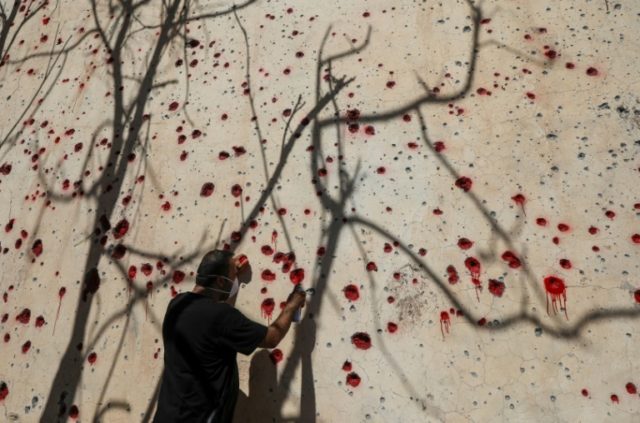A representative for one of the two Iranian Kurdish parties operating in Iraq who the Iranian Revolutionary Guard Corps (IRGC) bombed this week urged the United States on Wednesday to intervene and support their right to exist freely.
The IRGC fired missiles at the headquarters of the Democratic Party of Iranian Kurdistan (PDKI) and the Kurdistan Democratic Party of Iran (KDP-I) on Sunday without asking Baghdad for permission to enter the country, claiming both organizations are “criminal groups” for advocating for the rights of Kurds in Iran and that the attack destroyed a “terrorist training center.” The attack killed 15 people and injured 42.
In a subsequent statement Thursday, the IRGC said the attack was necessary to show Iran’s “unique ability to fight against arrogant foreign powers.”
The IRGC has played a role in decades’ worth of terrorist attacks. The U.S. Department of the Treasury has sanctioned the IRGC as a terrorist organization, and a movement for the State Department to list the IRGC as a Foreign Terrorist Organization has gained momentum in the past several years.
Speaking on behalf of the KDP-I, which operates out of the Erbil region of Iraq after fleeing Iran, spokesperson Asso Hassan Zadeh lamented that Washington had taken little action so far to curb Iran’s growing violations of Iraq’s sovereignty to attack Kurds.
“We have seen a lot of words, not actions, not deeds. We are waiting. Our contacts with officials in Washington are improving every day,” Zadeh said, according to Kurdistan 24. “The real strategy [in Iran] of the Trump administration is not clear. Is it regime change, or stopping the regime’s behavior in this region?”
Zadeh encouraged Washington not just to support the Kurds, but to support the establishment of a free society in Iran to replace the repressive Islamist regime ruling there or decades. Regime change, he argued, would also limit Iran’s “destabilization activities in other countries in the region.”
“It’s very important to emphasize the urgent need to have a democratic free government in Iran. There will be no peace and stability in the region as long as we have the Islamic Republic,” he insisted. “When the Iranian army attacked our headquarters in 1996 and came until Koy Sinjaq, the attack was stopped by the US military air force. That’s what we really need now: concrete measures, not just condemnations.”
The KRG, which governs the area where the Iranian Kurdish parties operate in exile, issued a statement following the attack, condemning it and urging other countries who have quarrels with groups whose members partially reside in KRG territory to not destroy the KRG. The IRGC attack follows similar attacks by the Turkish military on the Kurdistan Workers’ Party (PKK), a U.S.-designated Marxist terrorist group, on KRG land.
“We call for restraint and respect of the laws of Kurdistan, and avoiding turning the Region into a dispute-settling ground,” the KRG statement read.
The KRG has stood firm and rejected Iranian demands to hand over the leaders of the political parties they bombed. According to Rudaw, an official spokesman for the KRG described the individuals in question as “immigrants,” not fugitives, and noted that some leaders have found a refuge in the KRG since long before it existed as such in the 1980s.
Vice President Mike Pence reached out to KRG Prime Minister Nechirvan Barzani following the IRGC attack. Pence reportedly condemned the IRGC attack but did not offer any aid against further Iranian invasions. Pence did congratulate the KRG for its support for the rights of religious minorities and “the leaders agreed to work closely on helping Iraq’s persecuted religious communities return to their ancestral homes,” according to Washington.
Barzani issued a statement on Twitter thanking the U.S. for supporting the KRG:
1/ In a call with @VP, I reiterated KRG’s commitment in the fight against terror, and highlighted our efforts to help form an inclusive and representative government in Baghdad. I highly value the US support to the Kurdistan Region and work to further strengthen our ties.
— Nechirvan Barzani (@PMBarzani) September 10, 2018
The Trump administration has largely stepped away from its support of Iraq’s Kurds despite the pivotal role that the Peshmerga, the KRG military, played in defeating the Islamic State in that country. President Donald Trump himself rejected the idea of supporting the KRG following a military attack by Baghdad in response for the KRG holding a non-binding referendum on independence a year ago. Baghdad responded to the peaceful vote by invading Kirkuk, a territory the Peshmerga saved from ISIS capture in 2014.
“We don’t like the fact that they’re clashing. We’re not taking sides, but we don’t like the fact that they’re clashing,” Trump said at the time.

COMMENTS
Please let us know if you're having issues with commenting.